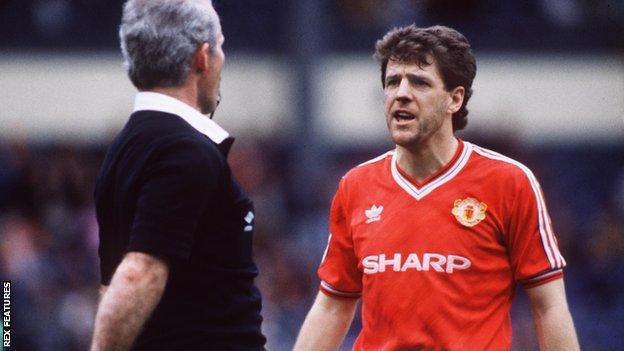Former Aston Villa & Man Utd player Colin Gibson reveals he has dementia
- Published

Colin Gibson joined Manchester United from Aston Villa in 1985
Former Aston Villa and Manchester United player Colin Gibson has revealed he has dementia.
Gibson, 62, was part of the Villa team that won the old First Division in 1980-81 and was an unused substitute when they won the European Cup in 1982.
"I'm not going to go down without a fight," Gibson told the Daily Mail., external
Gibson, who also played for Leicester City, Blackpool and Walsall, said he received his early-onset diagnosis in November 2021.
Supported by his wife, Kim, he hopes going public about his condition will help raise awareness of dementia.
"Sometimes you get yourself into a slightly embarrassing position where you completely forget something and you haven't got an answer and can't find the words," he added.
"And they think, 'Oh look at that thick footballer'.
"It felt logical [announcing his diagnosis]. At least people around us can then understand.
"The reason we're doing this is to make more people aware. If we can help just one person, it's worth it.
Allow X content?
This article contains content provided by X. We ask for your permission before anything is loaded, as they may be using cookies and other technologies. You may want to read X’s cookie policy, external and privacy policy, external before accepting. To view this content choose ‘accept and continue’.
"As a footballer, you don't like to show weakness to your opponents. We've got our certain kind of pride.
"There is plenty of support out there. Don't be ashamed, don't hide behind this masculine sort of facade."
In a statement, Gibson thanked Dawn Astle, the daughter of former England and West Brom striker Jeff Astle, who died in 2002.
A neuropathologist said Astle died of a brain condition normally linked to boxers and caused by heading footballs.
"I would also like to personally thank Dawn Astle from the Jeff Astle Foundation who has helped me and my wife especially in helping us reveal my condition," he added.
"Dawn's help and support has been truly amazing. I am fit and well and able to do most things that I enjoy."
According to research in 2019, former professional footballers are three and a half times more likely to die of dementia than people of the same age range in the general population.
Experts at Glasgow University investigated fears that heading the ball could be linked to brain injuries.
It compared deaths of 7,676 ex-players to 23,000 from the general population.
New guidelines issued last July said professional footballers in England were to be limited to 10 "higher force headers" a week in training from the 2021-22 season.
In August, new research showed defenders are more likely to have dementia in later life compared with other playing positions in football.
Earlier this year, a dedicated care department for former players living with neurodegenerative disease (NDD) was set up by the Professional Footballers' Association.

Our coverage of your Premier League club is bigger and better than ever before - follow your team and sign up for notifications in the BBC Sport app to make sure you never miss a moment
